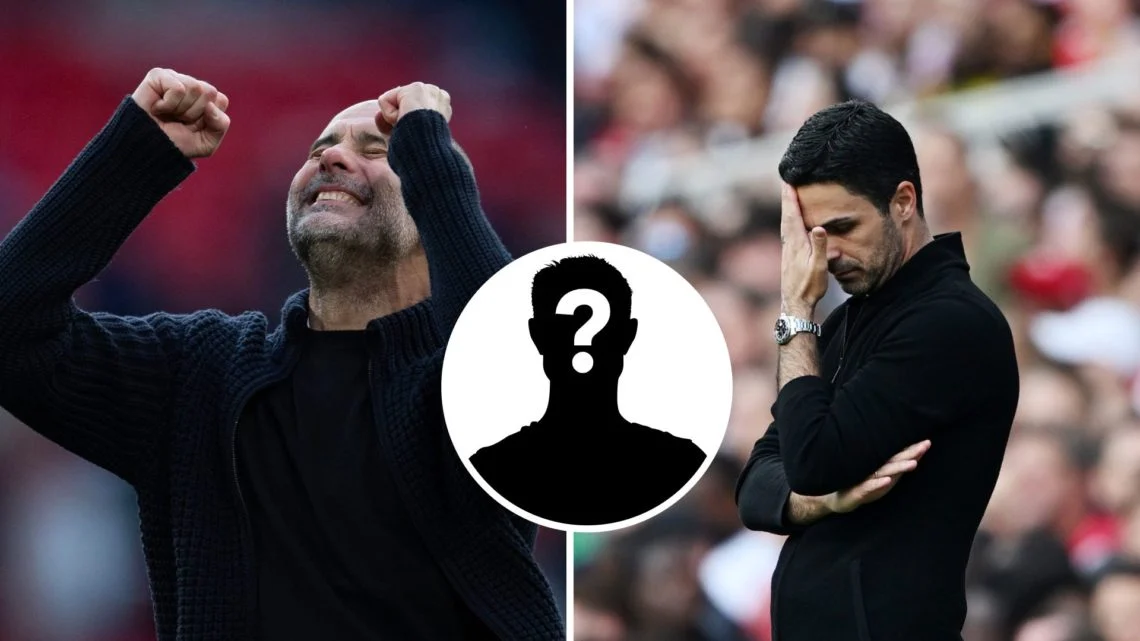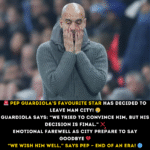Pep Guardiola could now have a breakout star next season who Arsenal wanted to sign before he joined Man City

In the ever-evolving landscape of modern football, where established stars often dominate headlines and transfer speculation, it is the emergence of young, relatively unknown talents that frequently shapes the future trajectory of elite clubs. As Manchester City prepares for the 2025/2026 season under the astute guidance of Pep Guardiola, the spotlight increasingly falls not just on household names like Erling Haaland and Rodri, but on the potential breakout stars who could define the club’s next chapter. Among these emerging talents, one name stands out with particular promise: Vitor Reis, the 19-year-old Brazilian center-back whose arrival at the Etihad Stadium in January has begun to generate significant excitement within the club’s corridors.
To understand the significance of Vitor Reis’s emergence, one must first examine the broader context of Manchester City’s defensive situation entering the new season. The club finds itself at a critical juncture where established defensive pillars are showing signs of vulnerability, creating opportunities for fresh talent to make their mark. Ruben Dias, once considered among the world’s elite center-backs and a cornerstone of City’s defensive structure, has experienced a noticeable dip in form that has raised questions about his long-term reliability in Guardiola’s system.
Similarly, Manuel Akanji, who arrived with considerable promise and initially impressed with his composure and versatility, has seen his overall game decline significantly. The Swiss international’s struggles have been particularly evident in his inability to adapt to the evolving demands of Guardiola’s tactical approach, especially as the Catalan coach has increasingly pushed his full-backs higher and wider on the pitch. This tactical evolution has placed greater emphasis on center-backs who possess the athleticism and spatial awareness to defend vast areas of the pitch, a requirement that has exposed some of the limitations in City’s current defensive options.
The emergence of Josko Gvardiol and Abdukodir Khusanov has provided some cause for optimism, with both players showing flashes of the quality needed to succeed at the highest level. However, their development remains a work in progress, and neither has yet demonstrated the consistency required to be considered a guaranteed starter in crucial matches. This defensive uncertainty has created the perfect environment for a young talent like Vitor Reis to potentially accelerate his development and establish himself as a key figure in the team’s future plans.
The story of Vitor Reis’s journey to Manchester City becomes even more intriguing when considering Arsenal’s interest in the young Brazilian. The North London club’s pursuit of Reis before his eventual move to the Etihad Stadium represents a fascinating subplot in the ongoing rivalry between two of England’s most ambitious clubs. Arsenal’s interest in Reis was not merely speculative; it reflected a genuine belief within the club that the teenager possessed the attributes necessary to contribute meaningfully to their defensive setup.
Under Mikel Arteta’s guidance, Arsenal has undergone a significant transformation, evolving from a team struggling to maintain consistency to genuine title contenders. Central to this evolution has been the club’s emphasis on defensive solidity, with Arteta implementing a system that demands center-backs who are comfortable both in possession and when defending larger spaces. The Spanish manager’s interest in Reis suggested that the Brazilian’s skill set aligned perfectly with Arsenal’s tactical requirements and long-term vision.
However, Manchester City’s ability to secure Reis’s signature demonstrates the club’s superior pulling power in the current transfer market. While Arsenal could offer the promise of potentially more immediate first-team opportunities, City’s combination of financial resources, established success, and the allure of working under Pep Guardiola proved decisive. The Brazilian’s decision to choose the Etihad Stadium over the Emirates represents not just a personal career choice, but a reflection of the broader competitive dynamics within English football.
For Arsenal, missing out on Reis could prove costly in the long term. The club’s defensive options, while solid, lack the depth and potential for sustained excellence that a talent like Reis might have provided. As Arsenal continues to compete on multiple fronts and seeks to establish itself as a consistent challenger for major honors, the absence of promising young defenders who could develop into world-class talents may become increasingly significant.
Pep Guardiola’s tactical approach has undergone subtle but significant evolution during his tenure at Manchester City, particularly in how he deploys his defensive personnel. The Spanish coach’s decision to push his full-backs higher and wider, especially during the latter part of the previous season, has fundamentally altered the defensive responsibilities of his center-backs. This tactical adjustment requires defenders who possess not just traditional defensive qualities, but also the athleticism and spatial intelligence to cover larger areas of the pitch effectively.
Vitor Reis appears to embody the ideal profile for this evolved defensive role. His performances against Wydad AC, Plymouth Argyle, and Leyton Orient, while admittedly against varied levels of opposition, have showcased several key attributes that align perfectly with Guardiola’s requirements. The Brazilian’s reading of the game has been particularly impressive, demonstrating an intuitive understanding of positioning and timing that often takes years to develop in young defenders.
His aerial prowess represents another crucial asset in Guardiola’s system. While the Spanish coach is renowned for his emphasis on possession-based football, the reality of modern competition means that teams must be prepared to defend set pieces and aerial duels effectively. Reis’s dominance in the air provides City with an additional weapon while also offering defensive security that has sometimes been lacking in recent seasons.
Perhaps most importantly, Reis’s vocal leadership qualities set him apart from many players of his age. Leadership from center-backs is crucial in Guardiola’s system, where defenders are expected to organize not just the defensive line but also initiate attacking moves and communicate tactical adjustments throughout matches. The fact that a 19-year-old is already demonstrating these leadership qualities suggests a maturity and football intelligence that could see him fast-tracked into regular first-team consideration.
His comfort in possession represents the final piece of the puzzle that makes him such an attractive prospect for Guardiola. The ability to play out from the back with composure and precision is non-negotiable in the Spanish coach’s system, and Reis has already shown that he possesses the technical skills and mental fortitude to contribute effectively to City’s build-up play.
Vitor Reis’s emergence comes at a time when Manchester City faces several key decisions regarding squad development and generational transition. The club’s policy of keeping the Brazilian for the upcoming season rather than sending him out on loan represents a clear statement of intent regarding his potential importance to the team’s immediate and long-term plans.
This decision reflects a broader shift in how elite clubs approach the development of young talent. Rather than automatically assuming that loan moves provide the best development pathway, clubs are increasingly recognizing the value of keeping promising players within their own training environments, where they can work directly with elite coaches and alongside established international players.
For other young players within City’s system, Reis’s integration into the first-team setup provides both inspiration and competition. The Brazilian’s rapid progression from relative unknown to potential first-team regular demonstrates that opportunities exist for those who can demonstrate the required quality and mentality. This internal competition can only benefit the club’s overall development strategy.
The impact extends beyond individual player development to broader squad dynamics. Having a versatile young defender who can potentially fill multiple roles provides Guardiola with additional tactical flexibility. Reis’s ability to defend in wide areas, combined with his central defensive capabilities, means he could potentially be deployed in various formations and systems depending on tactical requirements and opponent analysis.
The enthusiastic endorsement of Vitor Reis by his compatriot Ederson carries particular weight given the goalkeeper’s experience and standing within the squad. Ederson’s prediction that Reis could become “one of the best defenders in the world” is not made lightly, coming from a player who has worked alongside some of the world’s elite defenders during his time at City.
The Brazilian connection within the City squad has created an environment conducive to Reis’s adaptation to English football. The presence of Ederson, Savinho, and Matheus Nunes provides the young defender with a support network of players who understand the cultural and linguistic challenges of adapting to life in Manchester. This support system could prove crucial in accelerating his development and helping him overcome the inevitable challenges that come with establishing himself in one of the world’s most competitive leagues.
Ederson’s specific praise for Reis’s willingness to learn and his dedication to improvement both on and off the pitch highlights qualities that often separate good players from great ones. The goalkeeper’s observation about Reis’s commitment to English language classes demonstrates the comprehensive approach the young Brazilian is taking to his development, recognizing that success at the highest level requires excellence in all aspects of professional life.
The mention of daily conversations between the Brazilian contingent suggests a level of mentorship that could prove invaluable for Reis’s development. Having experienced players who can provide guidance on everything from tactical understanding to lifestyle management represents a significant advantage for any young player trying to establish himself at an elite club.
Despite the optimism surrounding Vitor Reis’s potential, the reality of integrating a 19-year-old defender into Premier League football presents significant challenges that cannot be overlooked. As Ederson acknowledged, it is particularly difficult to immediately insert young defenders into the intense, physical environment of English football, especially within a team that faces the constant pressure of competing for multiple trophies.
The Premier League’s unique combination of pace, physicality, and tactical sophistication means that even the most promising young defenders often require time to adapt fully. The margin for error at the top level is minimal, and defensive mistakes are often punished immediately and severely. This reality means that while Reis may possess all the technical and physical attributes necessary for success, his integration into regular first-team football will likely be a gradual process.
However, Manchester City’s current defensive situation may necessitate a more accelerated integration timeline than might typically be preferred. With question marks surrounding the form of established center-backs and the ongoing need for tactical flexibility, opportunities for Reis to prove himself may arise more frequently than might otherwise be expected.
The key to successful integration will be managing expectations while providing appropriate opportunities for development. Guardiola’s track record with young players suggests he understands the delicate balance required to nurture talent without overwhelming inexperienced players with excessive pressure or responsibility.
One of the most intriguing aspects of Vitor Reis’s potential role at Manchester City lies in the tactical flexibility his skill set could provide Pep Guardiola. The Brazilian’s combination of central defensive solidity and ability to defend in wider areas opens up various tactical possibilities that could prove crucial as the team continues to evolve.
The modern game increasingly demands defenders who can operate effectively in multiple positions and systems. Reis’s athleticism and spatial awareness suggest he could potentially be deployed as a conventional center-back in a back four, as part of a three-man central defense, or even as a defensive midfielder in certain tactical setups. This versatility represents significant value in squad construction and tactical planning.
Furthermore, his comfort in possession could allow Guardiola to experiment with more adventurous attacking formations, knowing that the defensive structure remains solid even when other players are pushed forward into more attacking positions. The Brazilian’s ability to step into midfield areas with the ball could create additional numerical advantages in the middle of the pitch while maintaining defensive security.
As football continues to evolve tactically, with teams constantly seeking new ways to gain advantages over their opponents, having players who can adapt to multiple roles and responsibilities becomes increasingly valuable. Reis’s potential to fulfill various tactical functions could make him an indispensable part of Guardiola’s future planning.
The psychological component of a young player’s breakthrough season cannot be underestimated, particularly in the high-pressure environment of Manchester City. For Vitor Reis, the challenge extends beyond demonstrating technical and tactical competence to managing the mental demands of competing at the highest level consistently.
The expectation that comes with being identified as a potential breakout star brings both opportunities and pressures. Media attention, fan expectations, and internal pressure to justify the club’s faith in his abilities all contribute to a complex psychological landscape that young players must navigate successfully.
However, Reis appears to possess several psychological attributes that suggest he may be well-equipped to handle these pressures. His vocal leadership qualities indicate a level of mental maturity that often takes years to develop. Young players who can communicate effectively with teammates and maintain composure under pressure typically adapt more successfully to the demands of elite football.
The support structure around him, including his Brazilian teammates and the club’s established player development programs, should provide the necessary foundation for managing the psychological challenges of his potential breakthrough season. The key will be maintaining focus on continuous improvement rather than becoming overwhelmed by external expectations or pressure.
The long-term implications of Vitor Reis’s development trajectory extend far beyond his individual success to the broader competitive landscape between Manchester City and Arsenal. For City, successfully developing Reis into a world-class defender would represent both sporting and financial success, potentially providing the club with a cornerstone defender for the next decade while also demonstrating the effectiveness of their player development strategies.
For Arsenal, watching Reis fulfill his potential at a direct rival would serve as a reminder of the fine margins that often separate success from missed opportunities in modern football recruitment. The North London club’s failure to secure his signature could prove particularly frustrating if the Brazilian develops into the world-class defender that many predict he could become.
The broader implications for both clubs’ recruitment strategies are also significant. City’s success in attracting and developing young talent like Reis reinforces their position as one of the world’s most attractive destinations for promising players. This reputation creates a positive cycle where success breeds further success in the transfer market.
As Manchester City prepares for the 2025/2026 season, the emergence of Vitor Reis represents more than just the development of another promising young player. His story embodies the club’s commitment to combining immediate success with long-term planning, their ability to identify and nurture talent from around the world, and their capacity to create environments where young players can thrive alongside established stars.
The Brazilian’s journey from relative obscurity to potential breakout star illustrates the dynamic nature of modern football, where opportunities can arise quickly for those prepared to seize them. His combination of technical ability, physical attributes, tactical intelligence, and mental maturity suggests that he possesses all the ingredients necessary for success at the highest level.
For Pep Guardiola, the emergence of a player like Reis provides both immediate tactical options and long-term strategic possibilities. The Spanish coach’s ability to integrate young talent while maintaining the team’s competitive edge will be tested once again, but his track record suggests that both player and manager could benefit significantly from their collaboration.
As the new season approaches, football fans around the world will watch with interest to see whether Vitor Reis can fulfill the considerable promise he has shown in his early appearances for Manchester City. If he can successfully make the transition from promising prospect to established first-team player, he may well prove to be not just the club’s breakout star of the season, but one of the most significant defensive talents to emerge in recent years.
The stage is set for what could be a defining season in the young Brazilian’s career, and by extension, a potentially transformative period for Manchester City’s defensive evolution. Only time will tell whether Vitor Reis can live up to the considerable expectations that have been placed upon his shoulders, but all early indications suggest that both he and Manchester City are well-positioned for what promises to be an exciting journey ahead.















